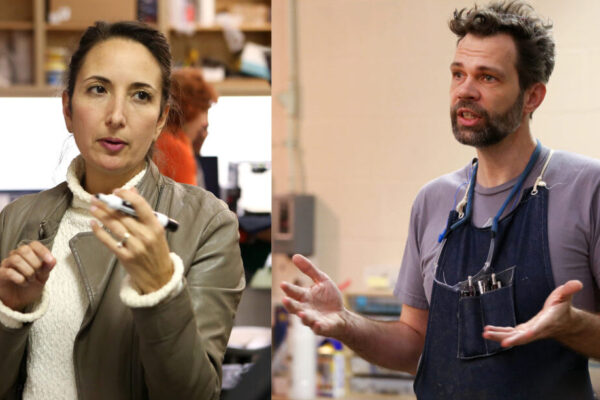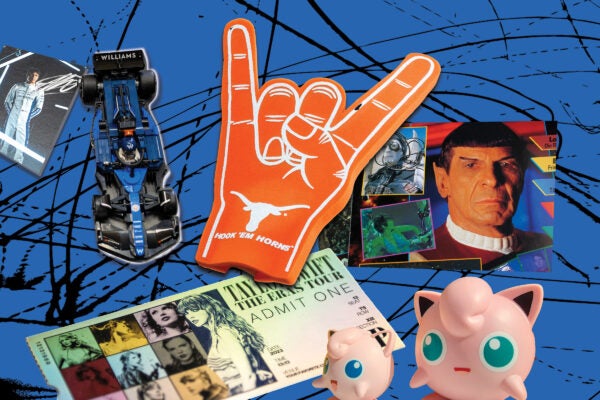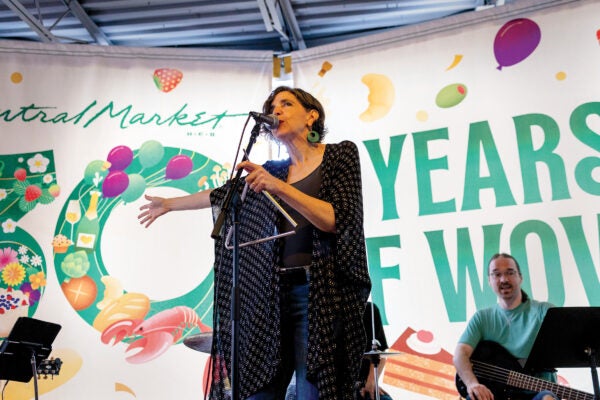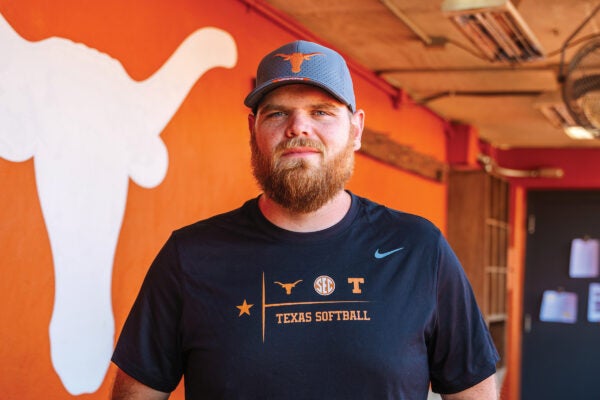A scribbled note on a napkin laid the foundation for a project that brings together students from different disciplines to learn in a hands-on way.
Shelly Rodriguez and J.E. Johnson were at the 2019 Nation of Makers Conference, an annual event where leaders of the maker movement — a culture that emphasizes learning through doing — congregate to spark connections and ideas. Over avocado toast one morning, they sketched out their plan for UT Bridge Makers, a group of students from the College of Natural Sciences and the College of Fine Arts that aims to demonstrate the value of collaborative making. Its first project would be a cardboard arcade experience that was set to debut this year at Explore UT.
Rodriguez and Johnson each say they discovered an interest in this kind of learning before their time at UT, and both have been involved in Austin’s maker community.
Johnson, the scenic studio supervisor for Texas Performing Arts and a lecturer in the College of Fine Arts, says that he grew up in a family that encouraged learning how to build things. In college he majored in English, trying to pursue “something more serious than making things all the time,” he says, but he didn’t escape from creating.
“I ended up in a career where that’s what I do for a living,” Johnson says.
He began working as a carpenter for the Texas Performing Arts Center in 1997. In the years since, he’s had a growing curiosity about making and project-based teaching.
“I became really interested in interdisciplinary learning and experiential learning before I had words for those things,” Johnson says.
In 2013, he taught fourth through sixth grade summer camp students how to make working clocks entirely out of cardboard. After getting much encouragement from teachers “in that K-12 space,” Johnson started a consulting company called Maker Ready. There, he developed kits to help teachers feel more comfortable using tools and building so they could bring hands-on projects to their classrooms.
Johnson was going into these schools as an expert, but he says he learned a lot.
“What I found out since is that almost everything you can do in a third grade classroom translates in one way or another into an undergraduate course at UT,” he says.
In 2017, a Texas Performing Arts production required three wearable velociraptor suits, so Johnson designed a 15-week course with this as its goal, co-taught with Scenic Art Supervisor Karen Maness. It was offered to students in theater and dance, arts and entertainment technologies, and engineering.
At the end of the semester, the raptor suits were put on display in the Bass Concert Hall lobby. While attending a concert, Anne Braseby, a development specialist at the Faculty Innovation Center, saw the suits and emailed Johnson. The two have been collaborating about teaching innovation ever since. The following spring, the center helped fund Johnson’s next project-based class — a special-effects course.
Over the years, Johnson has both attended and led numerous workshops on experiential learning at the center.
“I don’t know where he gets his energy from. I really don’t,” Braseby says. “He just epitomizes the teachers that we want to see in our classes.”
Since fall 2017, Johnson has taught a project-based course each semester.
THE PASSION THAT THEY SHOWED IN THESE SETTINGS WAS SOMETHING I DIDN’T ALWAYS SEE IN MY SCIENCE CLASSROOMS.
Rodriguez, an associate professor of practice for the UTeach Natural Sciences program, also has been cultivating her passion for experiential and interdisciplinary learning for years.
While teaching science courses at a South Austin high school, Rodriguez had the opportunity to mentor several student teachers from the UTeach program. Though she had been a high school teacher for 12 years, she says she enjoyed working with pre-service teachers so much that she decided to apply when there was an opening with UTeach.
Since 2008, she has been preparing “really strong STEM teachers who have really great content knowledge but also know what it means to connect to students in the classroom,” Rodriguez says.
Like Johnson, she had an interest in project-based learning, so she began going to maker fairs to see what this community was all about.
“That was really exciting to see students innovating, creating and bringing their own ideas to life,” she says. “And the passion that they showed in these settings was something I didn’t always see in my science classrooms.”
Soon after, Rodriguez and her colleagues decided to add a maker mini-credentialing option to the UTeach program. She wanted to help broaden ideas about what it means to be involved in the STEM world.
“I feel like so often, we set up a culture of what math and science is and is not, and if you don’t fit that culture or if you’re not willing to adopt those things, then you may feel like you don’t have a place in that community,” Rodriguez says. “Whereas, what I loved about the maker community was that it was just open to everybody.”
By June 2019, Rodriguez and Johnson had met in the maker world and decided to attend the national conference together. Johnson says they looked at it “as an opportunity to have an extended meeting” outside UT.
In February, after months of planning, UT Bridge Makers members met for the first time and began planning their Explore UT projects. During the next month, with the help of mentors and a lot of cardboard, the natural sciences and fine arts students designed, planned and built a series of arcade games.
Rodriguez says it has been “a really rich experience” to see students from such different disciplines working together.
“It’s when these two things come together where we often find progress. I think that’s the beauty of this partnership,” she says.
Explore UT was canceled because of concerns about COVID-19, so Rodriguez and Johnson are looking for other ways to showcase the work of UT Bridge Makers once campus reopens.
Both educators say they think that every student should leave UT having learned in such a hands-on way.
“It gives us tremendous pleasure as humans to take a pile of something and turn it into something else,” says Johnson. “It’s just a tragedy that some people don’t get exposed to that anymore or are taught to be afraid of it or to think that it’s beneath them.”
Interdisciplinary learning “is something that has become central to what I feel is our responsibility as educators, because this is the way the world’s problems are structured,” Rodriguez says.



